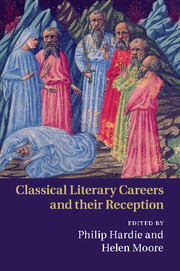Book contents
- Frontmatter
- Contents
- List of contributors
- Preface
- Note on the text
- Introduction: Literary careers – Classical models and their receptions
- 1 Some Virgilian unities
- 2 There and back again: Horace's poetic career
- 3 The Ovidian career model: Ovid, Gallus, Apuleius, Boccaccio
- 4 An elegist's career: from Cynthia to Cornelia
- 5 Persona and satiric career in Juvenal
- 6 The indistinct literary careers of Cicero and Pliny the Younger
- 7 Re-inventing Virgil's Wheel: the poet and his work from Dante to Petrarch
- 8 Did Shakespeare have a literary career?
- 9 New spins on old rotas: Virgil, Ovid, Milton
- 10 Bookburning and the poetic deathbed: the legacy of Virgil
- 11 Literary afterlives: metempsychosis from Ennius to Jorge Luis Borges
- 12 ‘Mirrored doubles’: Andrew Marvell, the remaking of poetry and the poet's career
- 13 Dryden and the complete career
- 14 Goethe's elegiac sabbatical
- 15 Wordsworth's career prospects: ‘peculiar language’ and public epigraphs
- Epilogue: Inventing a life – a personal view of literary careers
- List of works cited
- Index
6 - The indistinct literary careers of Cicero and Pliny the Younger
Published online by Cambridge University Press: 10 November 2010
- Frontmatter
- Contents
- List of contributors
- Preface
- Note on the text
- Introduction: Literary careers – Classical models and their receptions
- 1 Some Virgilian unities
- 2 There and back again: Horace's poetic career
- 3 The Ovidian career model: Ovid, Gallus, Apuleius, Boccaccio
- 4 An elegist's career: from Cynthia to Cornelia
- 5 Persona and satiric career in Juvenal
- 6 The indistinct literary careers of Cicero and Pliny the Younger
- 7 Re-inventing Virgil's Wheel: the poet and his work from Dante to Petrarch
- 8 Did Shakespeare have a literary career?
- 9 New spins on old rotas: Virgil, Ovid, Milton
- 10 Bookburning and the poetic deathbed: the legacy of Virgil
- 11 Literary afterlives: metempsychosis from Ennius to Jorge Luis Borges
- 12 ‘Mirrored doubles’: Andrew Marvell, the remaking of poetry and the poet's career
- 13 Dryden and the complete career
- 14 Goethe's elegiac sabbatical
- 15 Wordsworth's career prospects: ‘peculiar language’ and public epigraphs
- Epilogue: Inventing a life – a personal view of literary careers
- List of works cited
- Index
Summary
The careers of Cicero and Pliny the Younger go well together. Or at least so Pliny, who explicitly modelled himself on Cicero, would have hoped. Both were men of equestrian and non-Roman origins, noui homines who rose to the consulship (although Pliny notes at Epist. 4.8.5 that he attained both consulship and augurate while younger than Cicero), masters of eloquence in senate and law court, and recognized practitioners of a wide range of literary genres, including forensic oratory, poetry and epistolography. Pliny of course was well aware of the gulf in talent and, no less important, in political and forensic opportunities under the Principate which separated him from Cicero under the old Republic. Within the context of the present collection, nevertheless, the literary careers of Cicero and Pliny are a productive pairing, inasmuch as they both exhibit a certain indistinctness. However, the reasons for the indistinctness of each author's career differ in meaningful ways. These differences, as will be suggested later in the paper, possess significance in the context of the post-Ciceronian emergence of the ideal of a literary career – associated above all with Virgil – which pursues a trajectory from humbler to higher genres.
One conclusion of the second part of this paper will be to affirm the usefulness of the ‘Virgilian’ literary career as a way of thinking about the careers of other Classical authors.
- Type
- Chapter
- Information
- Classical Literary Careers and their Reception , pp. 118 - 137Publisher: Cambridge University PressPrint publication year: 2010
- 3
- Cited by



